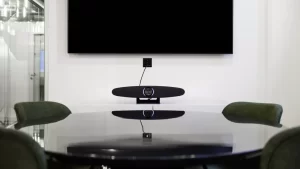Trust has been making digital cameras focusing on features people genuinely want, ignoring those that are rarely used.
The Trust IRIS 4K Ultra High Definition Conference Camera is on sale on Amazon for £589.00
It should be available across a range of popular retail outlets, at a similar price soon.
It’s hard to say why, but the Iris has the sort of design that we’d expect to see in a corporate context. Smooth curved lines with a combination of black and dark grey elements impart a stylish yet professional aesthetic.
This device is designed to sit at the end of a conference table or on a supporting table and provide a wide view of those assembled. Trust provides the Iris with a wall mount in the box, and as an optional accessory, they also have a TV mounting solution.
The viewing angle of the camera is 120 degrees, enabling it to see most attendees that are in front of it but not directly at the sides.
For it to function, his hardware must be connected to a computer by USB, and a three-metre is included with a Type-A connector at the computer end and a Type-C at the other to attach to the Iris.
Included is a small 24W power supply, avoiding the need for the USB to power the device.
As it is likely that the connected PC might be a laptop and therefore battery-powered, having a dedicated PSU has some understandable advantages.
It also comes with a small remote control that can make rapid adjustments to the direction of view, audio and brightness levels and the attendee that has focus. The remote is very useful, but we’d be concerned that this is the one part of the Iris package that could easily be misplaced, making it much less convenient.
Overall, the look of the Iris and the quality of construction is top-notch.
Because the Iris doesn’t need a software install, it works with all the meeting software we tested, like Zoom, Skype, Google Meetings, Microsoft Teams, etc.
In all of these scenarios, the camera and microphone appear as available devices once Iris is attached by USB, and the person hosting the meeting can enable and disable these inputs as required.
The automatic aspect of this design kicks in once the meeting starts, and the system will show a light around the camera lens to indicate that the camera is on. Muting the video or audio alters the colour of this illumination to show this status and avoid people embarrassing themselves with remote colleagues.
By default, the full quality of the Sony sensor camera delivers a 4K 60fps image of the whole scene, which should make everyone recognisable around the table.
A quick press of the remote can send the system into audio mode, where the camera will take instructions from the directional microphones as to who is speaking and centre on them.
One feature we especially liked is that the camera has an HDR mode. This methodology takes multiple images at different exposures and combines them to bring details out of the shadows and avoid overexposed sections of the image from blowing-out.
Many conference rooms aren’t uniformly lit, and HDR mode works well to address the classic mistakes where attendees are silhouetted against a bright window or hidden in the shadows.
The camera has logic that identifies faces and can move between them. But if you have something else you want to present, like a new product, then the camera can be directly controlled from the remote, and five levels of digital zoom are also available to get closer.
Optical zoom would have been preferable over digital, but with a 4K sensor, the results aren’t excessively blocky.
If you find that you constantly adjust the camera to a particular view, the remote can also store two preset views that can be recalled in a single button press when needed.
